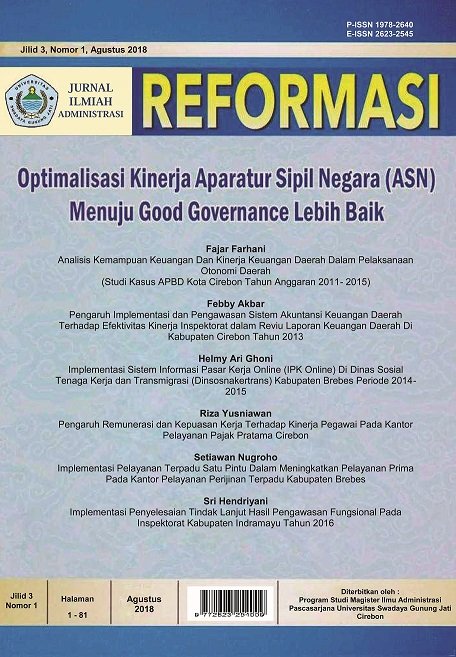Pengaruh Remunerasi Dan Kepuasan Kerja Terhadap Kinerja Pegawai Pada Kantor Pelayanan Pajak Pratama Cirebon
DOI:
https://doi.org/10.33603/.v3i1.1791Abstrak
The problem begins with the low performance of employees at the Cirebon Pratama Tax Service Office. Where the results of preliminary observations are suspected by low remuneration and employee job satisfaction. Thus this study uses a descriptive approach with the aim of finding the value of the magnitude of the effect of remuneration and job satisfaction on employee performance. The research method used is descriptive explanatory.
The results showed partially that the effect of remuneration on employee performance was 0.463 or 46.3% with the results of the T test found Thitung > Ttabel = 3.221 > 2.27 signifikan and positive, so H0 is accepted. While the results of the value of the effect of job satisfaction on employee performance was 0.563 or 56.3% with the results of the T test found Thitung > Ttabel = 4.204 > 2.27 significant and positive, so H0 is accepted. And the simultaneous influence obtained by the correlation value of 0.391 or 39.1% with the test F = 11.867 compared to F table = 3.32 (Fhitung > Ftabel) then the hypothesis is acceptable. While the remaining 60.9% is explained by other variables outside the variables of remuneration, job satisfaction and employee performance.
Conclusion Remuneration variables that have been given in the form of rewards received are reasonable, received bonuses are associated or not related to achievement, and the suitability of the rewards received has a positive influence in encouraging working harder according to the expected target. So that this can improve employee performance at the Cirebon Primary Tax Service Office. Likewise, employee job satisfaction variables in the Pratama Tax Office in Cirebon feel comfortable in working, pleasant work, salary in accordance with expectations, adequate career opportunities, conducive work environment and leadership style (human relations).Referensi
Bastian, Indra. 2010. Akuntansi Sektor Publik : Suatu Pengantar. Jakarta: Erlangga.
Byars & Rue. 2007. Human Resorces and Personal Management, Ricard D Irwin, Inc, Homeword, Illionis, United State of Amerika.
Dharma, Agus. 2004. Manajemen Supervisi, Cetakan Kelima, Edisi Revisi, Raja Grafindo Persada, Jakarta
Dwiyanto, A. 2011. Mengembalikan Kepercayaan Publik Melalui Reformasi Birokrasi. Jakarta:PT. Gramedia Pustaka Utama
Gomes, Faustino Cardoso. 2008. Manajemen Sumber Daya Manusia. Edisi ke-4. PenerbitL Andi Offset. Yogyakarta.
Ghozali, Imam. 2003. Analisis Multivariate dengan Program SPSS. BP UNDIP, Semarang.
Hasibuan, Malayu S.P. 2007. Manajemen Sumber Daya Manusia, Cetakan Kesepuluh. PT. Bumi Aksara, Jakarta.
Handoko, Hani T. 2003. Manajemen Sumber Daya Manusia. Gunung Agung.. Jakarta.
Ivancevich, J.M. Konopaske, Dahl, Robert dan Matteson, Michael T. 2007. Perilaku dan Manajemen Organisasi. Erlangga. Jakarta
Kinicki, Angelo & Robert Kreitner. 2003. Perilaku Organisasi. Edisi Pertama. Diterjemahkan oleh Erly Suandy. Jakarta: Salemba Empat.
Lin Grensing Pophal, 2008. Human Resources Book: Manajemen Sumber Daya Manusia Untuk Bisnis. Pranada Media; Jakarta.
Luthans, Fred. 2006.Perilaku Organisasi, Edisi 10. ANDI, Yogyakarta.
Mangkunegara, A.A. Anwar Prabu. 2010. Manajemen Sumber Daya Manusia Perusahaan. Remaja Karya. Bandung.
Mangkuprawira. S. 2008. Manajemen Sumber Daya Manusia Strategik. Cetakan Keempat, Jakarta: Galia Indonesia
Mahmudi, 2007. Manajemen Kinerja Sektor Publik. Yogyakarta: UPP STIM YPKN.
Mathew, Andrew. 2008. Are One Way Models of Effective Governmen Suitable for Developing Countries. Journsl of John F Kennedy School of Government – Harvard University, USA.
Mulyadi, 2007. Balaced Scorecard: Alat Manajemen Kontemporer untuk Pelipatgadaan Kinerja Keuangan Perusahaan: Jakarta: Salemba Empat.
Moeherino, 2009. Pengukuran Kinerja Berbasis Kompetensi. Cetakan Pertama: Gahlia Indonesia: Jakarta.
Mondy, R. Wayne. 2008. Manajemen Sumber Daya Manusia. Edisi Kesepuluh. Penerbit Erlangga. Jakarta.
Priyatno, Dwi. 2008. Mandiri Belajar SPSS. Yogyakarta: MediaKom
Ranupandojo, Hidjrachman dan Husnan, Suad. 2010. Manajemen Personalia. Edisi Tujuh: Yogyakarta: Pustaka Binawan Presindo FE-UGM.
Rivai, Veitzhal. 2007. Manajemen Sumber Daya Manusia. Edisi Kesebelas, Jakarta: PT Erlangga.
Robbin, Stephen P. 2007. Prinsip-prinsip Perilaku Organisasi. Edisi Kelima, Erlangga, Jakarta.
Rangkuti, Freddy. 2003. Manajemen Persediaan. PT. Raja Grafindo Persada.
Siregar, Syofyan. 2012. Statistika Deskriptif untuk Penelitian. Jakarta: PT Raj Grafindo Persada.
Sugiyono. 2008. Metode Penelitian Kuantitatif, Kualitatif dan R&D. Cetakan 17, Alfabeta, Bandung.
Sopiah. 2008. Perilaku Organisasional, Cetakan Pertama. Andi, Yogyakarta.
Supranto, J. 2001. Proposal Penelitian Contoh. Jakarta : Universitas Indonesia (UNI-PRESS).
Tua, Marihot. 2007. Manajemen Sumber Daya Manusia Pengadaan, Pengembangan, pengkompensasian, dan Pengingkatan Produktifitas Pegawai. Jakarta: Grasindo
Umar, Husein. 2008. Riset Sumber Daya Manusia Dalam Organisasi. Jakarta: Gramedia
Wibowo. 2007. Manajemen Kinerja. PT Raja Grafindo Persada. Jakarta.
Sumber Lainnya
Djati, S. P. Dan M. Khusaini. 2003. Kajian Terhadap Kepuasan Kompensasi, Komitmen Organisasi dan Prestasi Kerja. Jurnal Manajemen dan Kewirausahaan Universitas Kristen Petra Surabaya, No.5(1): 25-41
Fitria, Risni. Idris, Adam. Dan Kusuma, Aji Ratna. 2014. Pengaruh Remunerasi, Motivasi dan Kepuasan Kerja terhadap Kinerja Pegawai di Kantor Pengadilan Tinggi Agama Samarinda. E-journal Administrative Reform. 2014. 2(3):1691-1705. ar.mian.fisip-ummul.ac.id
Martini, Rina. 2011. Remunerasi dan Rasa Keadilan Masyarakat. E-Journal Undip Vol.38(2): 61-66
Sancoko, B. 2010. Pengaruh Remunerasi terhadap Kualitas Pelayanan Publik. Jurnal Ilmu Administrasi dan Organisasi. Universitas Indonesia. No, 17(1):43-51
Perpres Nomor 37 Tahun 2015 tentang Tunjangan Kinerja di lingkungan Direktorat Jenderal Pajak.
Unduhan
Diterbitkan
Terbitan
Bagian
Lisensi
The Authors submitting a manuscript do so on the understanding that if accepted for publication, copyright of the article shall be assigned to Jurnal REFORMASI, Sekolah Pascasarjana Ilmu Administrasi. Universitas Swadaya Gunung Jati as publisher of the journal. Copyright encompasses rights to reproduce and deliver the article in all form and media, including reprints, photographs, microfilms, and any other similar reproductions, as well as translations.Â
Jurnal REFORMASI, Universitas Swadaya Gunung Jati and the Editors make every effort to ensure that no wrong or misleading data, opinions or statements be published in the journal. In any way, the contents of the articles and advertisements published in Jurnal REFORMASI are the sole responsibility of their respective authors and advertisers.

